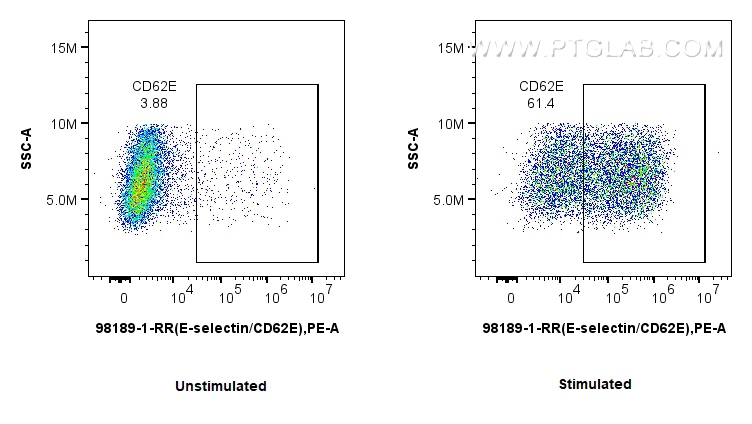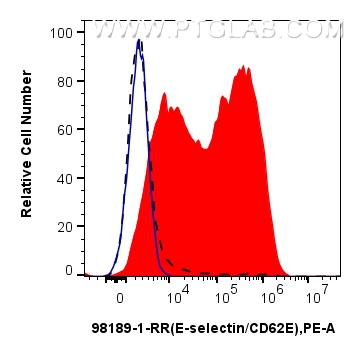验证数据展示
经过测试的应用
| Positive FC detected in | TNF alpha treated HUVEC cells |
推荐稀释比
| Application | Dilution |
|---|---|
| This reagent has been tested for flow cytometric analysis. It is recommended that this reagent should be titrated in each testing system to obtain optimal results. | |
| Sample-dependent, Check data in validation data gallery. | |
产品信息
98189-1-RR targets E-selectin/CD62E in FC applications and shows reactivity with human samples.
| Tested Applications | FC Application Description |
| Tested Reactivity | human |
| Immunogen | Recombinant Protein 种属同源性预测 |
| Host / Isotype | Rabbit / IgG |
| Class | Recombinant |
| Type | Antibody |
| Full Name | selectin E |
| Synonyms | CD62E, E-selectin, ELAM 1, ELAM, E selectin |
| Calculated Molecular Weight | 610 aa, 67 kDa |
| GenBank Accession Number | BC142711 |
| Gene Symbol | CD62E |
| Gene ID (NCBI) | 6401 |
| RRID | AB_3672328 |
| Conjugate | Unconjugated |
| Form | Liquid |
| Purification Method | Protein A purfication |
| UNIPROT ID | P16581 |
| Storage Buffer | PBS with 0.09% sodium azide, pH 7.3. |
| Storage Conditions | Store at 2 - 8°C. Stable for one year after shipment. |
背景介绍
E-selectin, also known as CD62E or ELAM-1, is a member of the selectin family of adhesion molecules that also includes L-selectin and P-selectin. E-selectin is an inducible endothelial cell surface molecule. Its expression on endothelial cells is transcriptionally upregulated by various proinflammatory substances such as IL-1, TNFα and lipopolysaccharide (LPS). Besides, it can be secreted by endothelial cells, and can be detected in a soluble form (sE-selectin) in serum. During inflammation, E-selectin plays an important part in recruiting leukocytes to the site of injury. (PMID: 2827173; 1382417; 8943958)
实验方案
| Product Specific Protocols | |
|---|---|
| FC protocol for E-selectin/CD62E antibody 98189-1-RR | Download protocol |
| Standard Protocols | |
|---|---|
| Click here to view our Standard Protocols |

